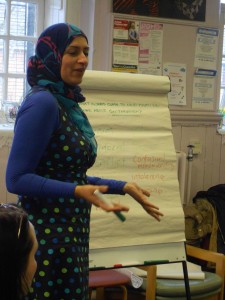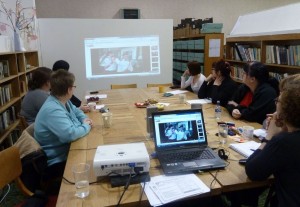For the last few months staff, volunteers and learners at GWL and beyond have been speaking about sectarianism – what it is, how it affects women, their lives, and their communities, and what can women do about it.

Different groups of women, from our women’s history groups in West Dunbartonshire to staff, learners and volunteers at the library in Glasgow, have been sharing their own experience and stories of how sectarianism has affected them and their different communities. A diverse range of women participated – some women had experience of moving to Scotland from elsewhere in the UK or migrating from other countries and some women had grown up in Scotland. A wide range of ages took part, from women in their 20s to women in their 80s and 90s
One of the aims of the project was to source and trial film and written resources (books, short stories and poetry) about women and sectarianism which would get people thinking and talking. The only problem was we couldn’t find any!
Films, books and poetry about sectarianism in Scotland with women as the protagonists are hard to find. However, in true intrepid women’s library spirit we searched, blogged and tweeted and, thanks to suggestions and ideas from lots of women and other organisations, we uncovered a few gems.
Exploring sectarianism across the world
We used films that were about sectarian conflicts in other countries, such as Nadine Labaki’s Where do we go Now? which is set against the backdrop of the Lebanese civil war.

We also used more traditional films about sectarianism such as Just Another Saturday which tells the story of a young man involved in an Orange Walk in Glasgow in the 1970s, and contemporary films such as Aye Fond Kiss.
The novels of Joan Lingard and Theresa Breslin, poetry and prose from Liz Lochhead and a range of other writing was read and discussed and inspired women to talk about their views and experience of Scottish intra-Christian sectarianism and to set it in the context of their own diverse experience.
Perhaps contrary to expectations, a significant part of the discussion was positive.
Women’s experiences of sectarianism
One Muslim woman talked about her experience of going to a Celtic football match. Another woman spoke about her memories of growing up in a Scottish working class community, where Catholics and Protestants “got on” together and supporting one another through hard times was more important than religious differences.

One of the most frequent conclusions in many of the discussions was that women needed to be supported to speak out more and let their voices be heard and empowered to change things within their own families and communities. Here’s what some women said:
“Highlight the patriarchal structures which exacerbate/justify sectarianism. We should downplay King Billy and the Pope and promote positive female role models from history and religion as alternatives.”
“Too many women feel they cannot
challenge sectarian attitudes within their own families and communities – Get women involved – work with them in groups and show them ways to be heard and challenge sectarianism. Make them feel empowered within their own families/partners and communities to challenge the status quo. Create information posters and leaflets for women, telling them where they can get support and help in challenging sectarianism.”
“…the best bits were talking about people’s experience, developing a better understanding of the issues. I felt safe and able to discuss a difficult subject”
Mixing the Colours Resource List
This is a list of accessible resources which have sectarianism as a theme and women as main protagonists. They are intended to be used with women’s groups as a tool for facilitating discussion on sectarianism and how intra-Christian sectarianism affects women in Scottish communities. The list has examples of sectarianism both in Scotland and across the world.
Most resources are easily available for purchase online, but multiple copies are available for borrowing from Glasgow Women’s Library. For more information please contact us.
You can view and download the Mixing the Colours resource list here.
Download: Mixing the Colours Resource list
We hope that Mixing the Colours will continue to develop more resources and that women themselves can continue to bring their own unique stories and experiences into the debate.
The Mixing the Colours project was made possible through funding from the Scottish Government Community Safety Unit.
For more information about the project contact Morag Smith on 0141 248 9969 or at info@womenslibrary.org.uk


Comments are closed.